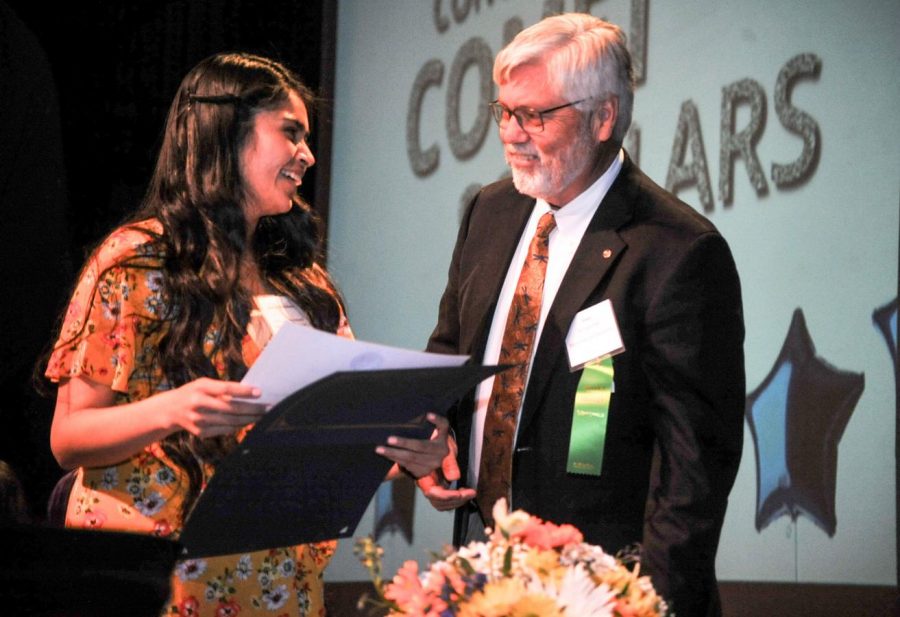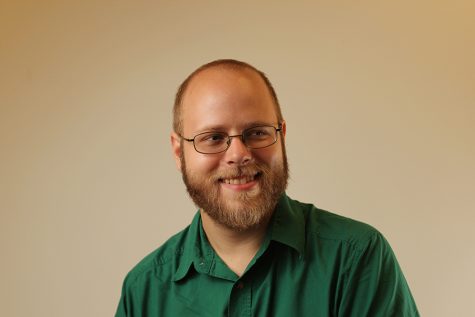Scholarly recognition
Josielyn Bustamante (left) receives a scholarship certificate from Foundation Secretary William van Dyk during the Scholarship Awards Ceremony in the Knox Center on May 2.
May 15, 2018
Each year most college scholarships go unclaimed.
District Chancellor Fred Wood said, “Students don’t look. Maybe they don’t think they’re good enough. Isn’t that sad?”
This year’s scholarships and awards were presented in the Knox Center, May 2 at the 59th Annual Scholarship Awards Ceremony, hosted by the Contra Costa College Foundation.
Foundation Development Officer Sara Marcellino said, “We worked hard to get more students to apply (and) we had very good success this year.
“We had 61 students (receive scholarships) last year, and 90 this year. We’d love to see that trend continue.”
“We’re giving away an average of $1,690 per student.”
That amounts to a total of $152,000, from 141 scholarships distributed among the 90 award recipients, she said.
Former college president Mojdeh Mehdizadeh said, “The faculty really rallied around it. Teachers discussed it with their classes. Maybe hearing from a professor makes it easier to ask that professor for a reference.”
Foundation Development Assistant Nelani Kale said of the scholarship drive, “It’s been more successful than previous years. There’s a 21 percent jump in the number who finished submitting applications (out of those who start).”
Wood said, “It’s always good that we’re able to give more scholarships out. It’s about a third more scholars and about a third more dollars.”
Financial aid specialist Patricia Herrera — donor to the #cccwheresmycheck scholarship — said, “It was a huge bump (from last year). We think it was because the application went online.”
She said students no longer have to print out anything. Most scholarships require no essay and general Foundation scholarships just have six brief essay questions, focused on who the applicant is and why they deserve the scholarship.
Applicants don’t even need to face the lines at the Financial Aid Office.
“We try to give away money eight hours a day at the Financial Aid Office. Having students take advantage of that is our dream,” she said.
Culinary arts major Christine Sanok said that after she retired, “I decided I wanted to go back to school. I was interested in cooking, but not professionally. I’d like to create a program in my church for some young people and high school students. I want to teach them some basic cooking skills (and) how to cook healthier food.”
She enrolled and after completing some classes she applied for the $3,000 Arizmendi Culinary Scholarship.
She got it.
She also claimed a spot in the culinary arts department’s study abroad trip to Italy.
“I didn’t find (applying) hard. It’s just an essay.”
Her husband Jim Sanok added, “If you go to college you have to write essays anyway. Who knows, you might win.”
Wood said he was the first in his family to attend college; his ailing father pushed him to be more than a carpenter like him.
Diablo Valley College was down the street from his home. “If I could not have ridden my bike to DVC I would not have gone to college,” Wood said.
In time, Wood himself was able to achieve a Ph.D. in chemistry thanks to a scholarship.
“When I transferred from DVC to (UC Davis) — that investment from my benefactor made all the difference,” Wood said. “It can make a huge difference. Someone investing in you, when someone cares about you.”
“There were times when it let me buy some macaroni and some cheese for dinner. Education is expensive, so every dollar counts.”
“What carried me through were the people who had invested in me.”
Business information and computer technology professor Joseph De Torres said he’s happy to help his students claim scholarships. “I have some students who are recipients tonight. I wrote some letters for them.”
He said he asks his students for some details about their lives to include in the letters and gives an account of their academic work.
De Torres said, “They’re committed to their majors and their programs. I think they should be supported and honored for that. “I want them to be able to at least compete for the awards for which they’re qualified.”
Heather Allan, a scholarship donor, funded —in her mother’s name— the Kathleen H. Allan Memorial Scholarship for $1,000.
“We did it in her honor because she worked for the college for many years (as a nursing instructor).”
“We want to give back to the college. Education was very important to her.”
Similarly, biology professor Chris Tarp created the Fred Tarp Memorial Scholarship for his father and to honor achievement among biology students.
Tarp said, “(Fred Tarp) was the first biology faculty hired in the district,” in 1949. Fred Tarp planted some of CCC’s big trees along the northern tributary of Rheem Creek.
Mehdizadeh gave to the CCC Foundation Scholarship. “I had the opportunity to be a donor (and) it’s just a privilege to be able to help.”
Governing Board Trustee Vicki Gordon also contributed to the Foundation Scholarship.
“It’s for students already here and it helps our students stay here when life gets in the way.”
Mehdizadeh said, “I was also lucky to serve as a reference and to see some recipients as a result. Now I get to see them walk across the stage.”



